More Thoughts on "The White Lotus: Sicily"
 Tuesday, December 13, 2022 at 12:30PM
Tuesday, December 13, 2022 at 12:30PM SPOILER ALERT: DO NOT READ UNLESS YOU HAVE VIEWED ALL SEVEN EPISODES.
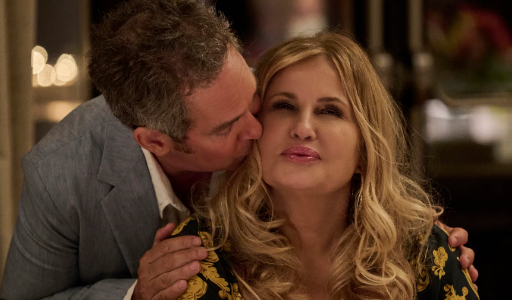
by Eric Blume
One of the things that separates The White Lotus from many other TV programs, which are usually divided amongst several writers and directors, is that the show has a very, very specific point-of-view. Even though other great television series (Succession, Severance, etc.) have a unified tone and the individual episodes are kept in harmony by the showrunner, it’s a different thing to have the same person actually writing and directing every episode. Mike White views the universe and views characters comically. He sees the world as an outsider does, with an arched eye towards human behavior, and he sees people as funny and full of contradictions. He also lends to White Lotus a truly gay sensibility, in terms of the way he frames his actors, the way he films male and female bodies, and the way his empathy shifts between characters in a roundelay of surprising reveals, each character granted grace notes, psychology, and humanity...
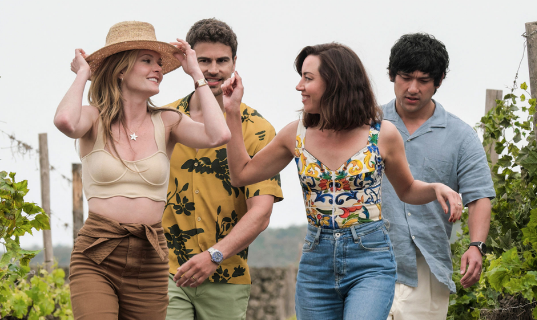
Just as White managed to find the specifically Hawaiian energy of Hawaii for Season 1, he nails the ravishing unknowability of Sicily in delectable glory. He captures the islander’s specific, centuries-worn wariness of intruders (note the both menacing and funny “family reunion’ scene with the Di Grassos), and both the beauty and threat of the surrounding sea. He builds on what he accomplished in Hawaii: showing an isolated island dependent upon tourism, and the toll it takes on the locals. He uses the iconography of Italian/Greek art, opera, and myth suspensefully, but also takes it to a comic extreme. It's one thing to understand the power these kinds of tropes and imagery have in our collective imaginations. Mike White takes it further. He has enough nerve to push it, but also the intelligence to stop just shy of exploiting it, to great effect.
The White Lotus is one of those shows where you can go moment to moment thinking one storyline is the best, the most interesting, the most compelling until the next storyline kicks into gear and makes you think THAT one is the best. It’s very easy to underestimate the balancing act White is doing, keeping all these barely-connected plates spinning full-throttle for seven hours. Part of the success comes from the outstanding editing team, who in conjunction with White, know just when to insert some images of terrifying wallpaper and a monkey howl to keep you on edge.
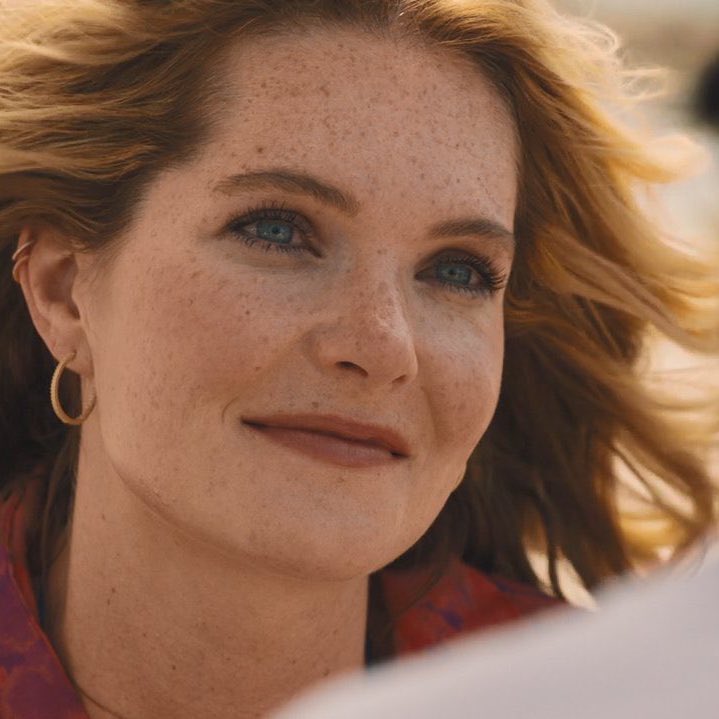
For my money, the most explosive arc was the quartet of married couples played by Theo James, Meghann Feahy, Will Sharpe, and Aubrey Plaza. These actors were on fire in every tightly-constructed scene, and the skill of the camera work and editing gives the audience room too; you know exactly where all four of them are at all times. Within these quartet scenes, White peels away their defenses with surgical precision, and each of the characters reveal themselves to all be the same thing: human. White’s dialogue finds the rhythms and language that married couples use when they’re alone, and how they adapt when they’re with others. And this narrative strand is where the gay sensibility really kicks in: at the end of the series, he leaves you in serious disorientation about things like monogamy and the true nature of honesty, our over-valuation of these concepts and the true challenges of their reality. One of the greatest moments of the show was Feahy’s quiet absorption of her husband’s latest behavior in the finale: she's a knockout.
White’s sympathy towards the island’s locals, embodied by hotel concierge Valentina (Sabrina Impacciatore) and two very complex hookers (Simona Tabasco and Beatrice Granno), is in full effect here. Impacciatore captures the locked-down fear of being a lesbian in such a macho culture, and her final stage of blossom is wonderful. White has a terrific turn with the characters in episode five, when we see the power dynamics spin, and Valentina moves an employee out of her way to get what she wants, and when Tabasco’s character starts manipulating young Albie (Adam DiMarco).
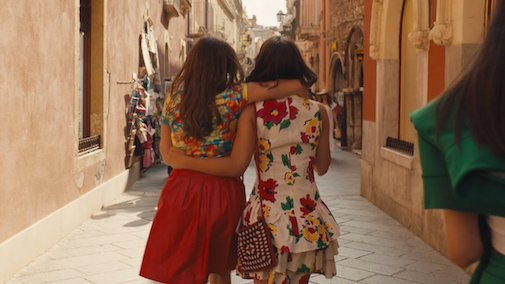
We’ve seen the dead ends these characters have had to face their entire life, with limited options and continual debasement, but White isn’t afraid to show them doing what they need to do to survive. In The White Lotus, everyone is ugly and everyone is beautiful. Again, very few male directors would end this series with Tabaasco and Granno walking triumphantly down the streets of Taormina…it shows where his heart is ultimately, and how much work these people have to do to get even a smidgeon of the opportunity of the rich characters.
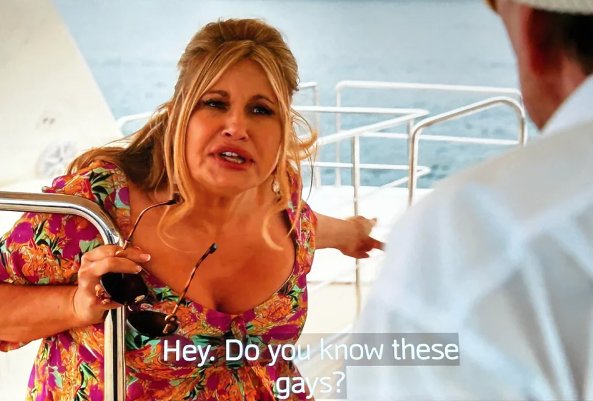
Then there’s Tanya, played once again by Jennifer Coolidge in a bravura turn that’s alternately still and off-center, delicate and gross, comic and now tragic. White really sees into Coolidge’s soul somehow, and he’s written her a part that captures everything that’s special about her. Her line readings come from somewhere in outer space, and she plays moments in ways no other actor might think of. Witness her insanely funny walk/run on the boat in the finale…where she’s speeding up when out of eyesight of the gays, and then her awkward slow-down when she passes them: it’s a huge risk to play something at that level of high comedy, especially in the midst of the most suspenseful section of the series, but damn if Coolidge and White don’t pull it off together. They are as in sync with each other as Todd Field and Cate Blanchett are in TÁR, and that kind of collaboration can really send a piece off into the stratosphere.
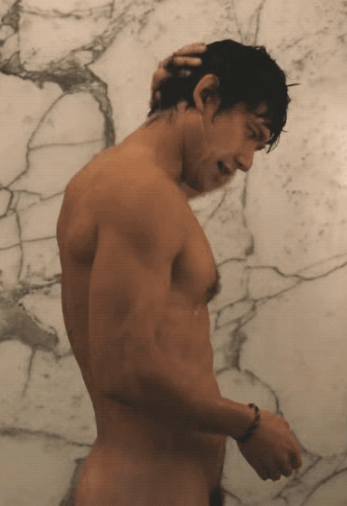
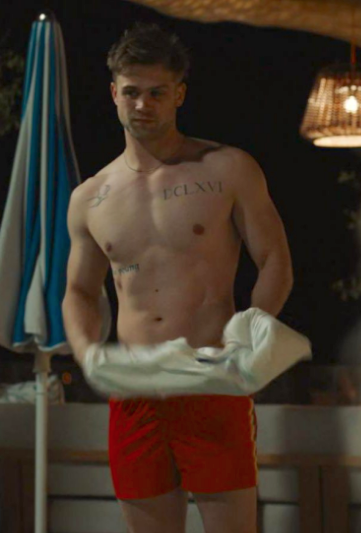
(A superficial thank you to White for giving the world four of the hottest man types we’ve seen in one show possibly ever: the hunky model [James]; the nerd with a banging bod [Sharpe]; the sweet youth [DiMarco], and the street thug [Leo Woodall]. Literally something for everyone. And those gorgeous women! Feahy, Plaza, Impacciatore, Tabsco, Granno…it’s absurd that all of these actors are that beautiful and that fiercely talented.)
In the end, both seasons of The White Lotus are about power, of course, and White unabashedly goes for the throat of not only the rich, but of everyone’s need for power and control. I didn’t think White could top what he did in Season One, but in one way he did. Here, in Sicily, he found a little bit of heroism in everyone, even in Cameron (Theo James). He gives Cameron that lovely moment at the very end of his story, where you see that he feels genuine pain and anger at having to be the father to children who are not his own, and how that responsibility is part of the deal in order for his entire life to work. It’s an original moment of reveal, and each character gets their moment where they perform a moment of goodness, where their humanity gets the best of them. Mike White and his players have done some miraculous work.
Who were your MVPs? Favorite storylines / actors? Please don’t go hating, these artists were really taking huge swings.



Reader Comments (10)
Let's hope to God we don't get Ryan Murphy's take on THE WHITE LOTUS anytime soon. ;-)
@David S-AMEN!!!! He's such a terrible writer/filmmaker/producer. An awful person as well.
"Cameron... [has] ... to be the father to children who are not his own"? How'd I miss that?
After Meghann Fahy, I think my acting MVP this season was easily Leo Woodall.
He comes in like he's going to be an entertaining side character, a not-too-dimensional wrinkle in Haley Lu Richardson's subplot - then those last two episode he's just spectacular at revealing the emotional, dangerous depths of his character, turning from funny and boyish and boorish to haunted and menacing on a dime. Astonishing work.
@Dan H-It was implied when Daphne was telling Harper about her trainer. When she offered to show Harper a picture of him, she showed her a picture of her kids instead and then said "oops."
Dan H -- what Raul said. It's more an implication than a direct truth but when you pair it with his otherwise innocuous annoyance at having to get on facetime with his kids in the last episode it feels like maybe he knows on some level.
Duncan -- great point on how Leo turns that.
SAG voters, this is what a great ensemble is and not Don't Look Up.
In the first two episodes, he seems like he'll just be a hilarious, boyish, obnoxious side character; a not-too-dimensional wrinkle in the backrooms's subplot. But in the latter two episodes, he does a wonderful job of showing the emotional, hazardous layers of his character. Incredible results.
MVP:
Will Sharpe is a very interesting performer and writer. He was excellent in the criminally underseen (and cancelled after one season) Gir/Haji on Netflix. His turn to jealous husband in the later episodes of White Lotus was amaze-balls.
Also, the two young actresses who played the Italian prostitutes. So good, especially the one who sings.
My takeaways from this season:
1.Mike White knows how to make good television.
2. So glad Tom Hollander ended up NOT being cast as Paul Child in the Julia tv series (besides the fact that David Hyde Pierce is perfect in the role); he's so good as a smarmy villain.
3. I never want to work in retail or hospitality ever again.
4. Borrowing from critics I listened to recently, "every show needs a character with a UK Love Island accent."
5. I need to visit Sicily right now.
@Peggy Sue - yup.
EVERYONE was incredible but my MVP was Fahy.